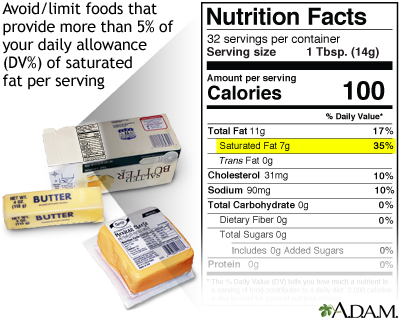Health Library
Butter, margarine, and cooking oils
Cholesterol - butter; Hyperlipidemia - butter; CAD - butter; Coronary artery disease - butter; Heart disease - butter; Prevention - butter; Cardiovascular disease - butter; Peripheral artery disease - butter; Stroke - butter; Atherosclerosis - butter
Images

I Would Like to Learn About:
Description
Some types of fat are healthier for your heart than others. Butter and other animal fats and solid margarine may not be the best choices. Alternatives to consider are liquid vegetable oil, such as olive oil.
What to Use When Cooking
When you cook, solid margarine or butter is not the best choice. Butter is high in saturated fat, which can raise your cholesterol. It can also increase your chance of heart disease. Some margarines have some saturated fat plus trans-fatty acids, which can also be bad for you. Both of these fats have health risks.
Some guidelines for healthier cooking:
- Use olive or canola oil instead of butter or margarine.
- Choose soft margarine (tub or liquid) over harder stick forms.
- Choose margarines with liquid vegetable oil, such as olive oil, as the first ingredient.
What Not to Use When Cooking
You should not use:
- Margarine, shortening, and cooking oils that have more than 2 grams of saturated fat per tablespoon (read the nutrition information labels).
- Hydrogenated and partially hydrogenated fats (read the ingredients labels). These are high in saturated fats and trans-fatty acids.
- Shortening or other fats made from animal sources, such as lard.
Related Information
Heart bypass surgeryCarotid artery surgery - open
Angioplasty and stent placement - carotid artery
Heart bypass surgery - minimally invasive
Cardiac ablation procedures
Heart pacemaker
Implantable cardioverter-defibrillator
Heart failure
High blood cholesterol levels
High blood pressure in adults – hypertension
Stroke
Angina
Angina - discharge
Heart attack – discharge
Angioplasty and stent - heart - discharge
Aspirin and heart disease
Being active when you have heart disease
Cardiac catheterization - discharge
Controlling your high blood pressure
Heart bypass surgery - discharge
Heart bypass surgery - minimally invasive - discharge
Heart disease - risk factors
How to read food labels
Heart failure - discharge
Stroke - discharge
Cholesterol and lifestyle
Dietary fats explained
Fast food tips
Mediterranean diet
Cholesterol - what to ask your doctor
Cholesterol - drug treatment
References
Arnett DK, Blumenthal RS, Albert MA, et al. 2019 ACC/AHA Guideline on the primary prevention of cardiovascular disease: executive summary: a report of the American College of Cardiology/American Heart Association Task Force on Clinical Practice Guidelines. J Am Coll Cardiol. 2019;74(10):1376-1414. PMID: 30894319 pubmed.ncbi.nlm.nih.gov/30894319/.
Hensrud DD, Heimburger DC. Nutrition's interface with health and disease. In: Goldman L, Schafer AI, eds. Goldman-Cecil Medicine. 26th ed. Philadelphia, PA: Elsevier; 2020:chap 202.
Mozaffarian D. Nutrition and cardiovascular and metabolic diseases. In: Libby P, Bonow RO, Mann DL, Tomaselli, GF, Bhatt DL, Solomon SD, eds. Braunwald's Heart Disease: A Textbook of Cardiovascular Medicine. 12th ed. Philadelphia, PA: Elsevier; 2022:chap 29.
Ramu A, Neild P. Diet and nutrition. In: Naish J, Syndercombe Court D, eds. Medical Sciences. 3rd ed. Philadelphia, PA: Elsevier; 2019:chap 16.
BACK TO TOPReview Date: 8/16/2022
Reviewed By: Michael A. Chen, MD, PhD, Associate Professor of Medicine, Division of Cardiology, Harborview Medical Center, University of Washington Medical School, Seattle, WA. Also reviewed by David C. Dugdale, MD, Medical Director, Brenda Conaway, Editorial Director, and the A.D.A.M. Editorial team.
 | A.D.A.M., Inc. is accredited by URAC, for Health Content Provider (www.urac.org). URAC's accreditation program is an independent audit to verify that A.D.A.M. follows rigorous standards of quality and accountability. A.D.A.M. is among the first to achieve this important distinction for online health information and services. Learn more about A.D.A.M.'s editorial policy, editorial process and privacy policy. A.D.A.M. is also a founding member of Hi-Ethics. This site complies with the HONcode standard for trustworthy health information: verify here. |
The information provided herein should not be used during any medical emergency or for the diagnosis or treatment of any medical condition. A licensed medical professional should be consulted for diagnosis and treatment of any and all medical conditions. Links to other sites are provided for information only -- they do not constitute endorsements of those other sites. No warranty of any kind, either expressed or implied, is made as to the accuracy, reliability, timeliness, or correctness of any translations made by a third-party service of the information provided herein into any other language. © 1997- 2024 A.D.A.M., a business unit of Ebix, Inc. Any duplication or distribution of the information contained herein is strictly prohibited.
